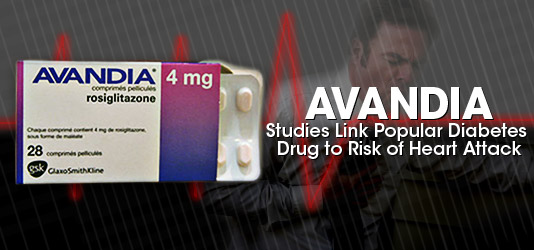Glaxo’s Avandia Raises Heart Risk – Study
Washington: It’s been already established that certain diabetes drugs can  cause heart attacks and death. A recent study has again revealed that several diabetes drugs, particularly GlaxoSmithKline's Avandia can do the same, but Glaxo does not agree with findings.
cause heart attacks and death. A recent study has again revealed that several diabetes drugs, particularly GlaxoSmithKline's Avandia can do the same, but Glaxo does not agree with findings.
According to the Canadian scientists, the drugs, such as thiazolidinediones, TZDs or glitazones have a significantly higher rate of death, heart attack and congestive heart failure and death.
Avandia from Glaxo and Actos from Takeda Pharmaceutical are known for raising the risks of heart failure, however the U.S. FDA has directed that Avandia should carry a "black box" warning that it may cause chest pain or heart attacks.
The risks of congestive heart failure, heart attack and all-cause death associated with the use of Avandia, known generically as rosiglitazone, and Actos compared to other, older diabetes drugs were studied by Dr. Lorraine Lipscombe of the Institute for Clinical Evaluative Sciences in Toronto and colleagues.
Medical records of 159,026 people aged 66 and older who were treated with diabetes pills for a median of 3.8 years, through March 2006, were analyzed by the study team.
The team found 60% increased risk of congestive heart failure, 40 % higher risk of heart attack and 29 % higher risk of overall death among the patients who were taking Avandia alone. However, the researchers did not see a higher risk for any of these for Actos.
Avandia is only prescribed for those patients who are not helped by older diabetes drugs known as metformin and sulfonylurea in Canada.
According to Glaxo, the study had "significant limitations and generates misleading conclusions."
In a statement, Glaxo said, “The majority of these studies show that rosiglitazone is not associated with an increased risk of myocardial infarction (heart attack) compared to other anti-diabetic agents. As the authors state, patients on TZDs in their analysis may represent an older, select group of patients with advanced diabetes and therefore higher baseline risk for cardiovascular disease. The rosiglitazone patients are therefore ones with higher baseline risk for cardiovascular disease.”
Adding that the studies published so far are inconclusive and that doctors should take the potential risks into account, the FDA said in a statement, “This new study we have just seen today does not change FDA's recommendations.”